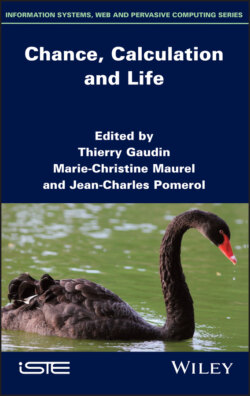Читать книгу Chance, Calculation and Life - Группа авторов - Страница 14
1.1.1. Brief historical overview
ОглавлениеDemocritus (460–370 BCE) determined the causes of things to necessity and chance alike, justifying, for example, the fact that atoms’ disorderly motion can produce an orderly cosmos. However, the first philosopher to think about randomness was most likely Epicurus (341–270 BCE), who argued that “randomness is objective, it is the proper nature of events”.
For centuries, though, randomness has only been mathematically analyzed in games and gambling. Luca Pacioli (in Summa de aritmetica, geometria, proporzioni et proporzionalita, 1494) studied how stakes had to be divided among gamblers, particularly in the difficult case when the game stops before the end. It is worth noting that Pacioli, a top Renaissance mathematician, also invented modern bookkeeping techniques (Double Entry): human activities, from gambling to financial investments, were considered as the locus for chance. As a matter of fact, early Renaissance Florence was the place of the invention of banks, paper currency and (risky) financial investments and loans1.
Cardano (in De Ludo Aleae (The Game of Dice), 1525) developed Pacioli’s analysis further. His book was only published in 1663, so Fermat and Pascal independently and more rigorously rediscovered the “laws of chance” for interrupted games in a famous exchange of letters in 1654. Pascal clarified the independence of history in the games of chance, against common sense: dice do not remember the previous drawings. Probabilities were generally considered as a tool for facing the lack of knowledge in human activities: in contrast to God, we cannot predict the future nor master the consequences of our (risky) actions. For the thinkers of the scientific revolution, randomness is not in nature, which is a perfect “Cartesian Mechanism”: science is meant to discover the gears of its wonderful and exact mechanics. At most, as suggested by Spinoza, two independent, well-determined trajectories may meet (a walking man and a falling tile) and produce a random event. This may be considered a weak form of “epistemic” randomness, as the union of the two systems, if known, may yield a well-determined and predictable system and encounter.
Galileo, while still studying randomness, but only for dice (Sopra le scoperte de i dadi, 1612), was the first to relate measurement and probabilities (1632). For him, in physical measurement, errors are unavoidable, yet small errors are the most probable. Moreover, errors distribute symmetrically around the mean value, whose reliability increases with the number of measurements.
Almost two centuries later, Laplace brought Pascal’s early insights to the modern rigor of probability theory (1998). He stressed the role of limited knowledge of phenomena in making predictions by equations: only a daemon with complete knowledge of all the forces in the Universe could “embrace in a single formula the movements of the greatest bodies of the universe and those of the tiniest atom; for such an intellect nothing would be uncertain and the future just like the past would be present before its eyes”. The connection between incomplete knowledge of natural phenomena and randomness is made, yet no analysis of the possible “reasons” for randomness is proposed: probability theory gives a formal calculus of randomness, with no commitment on the nature of randomness. Defining randomness proved to be a hugely difficult problem which has only received acceptable answers in the last 100 years or so.
